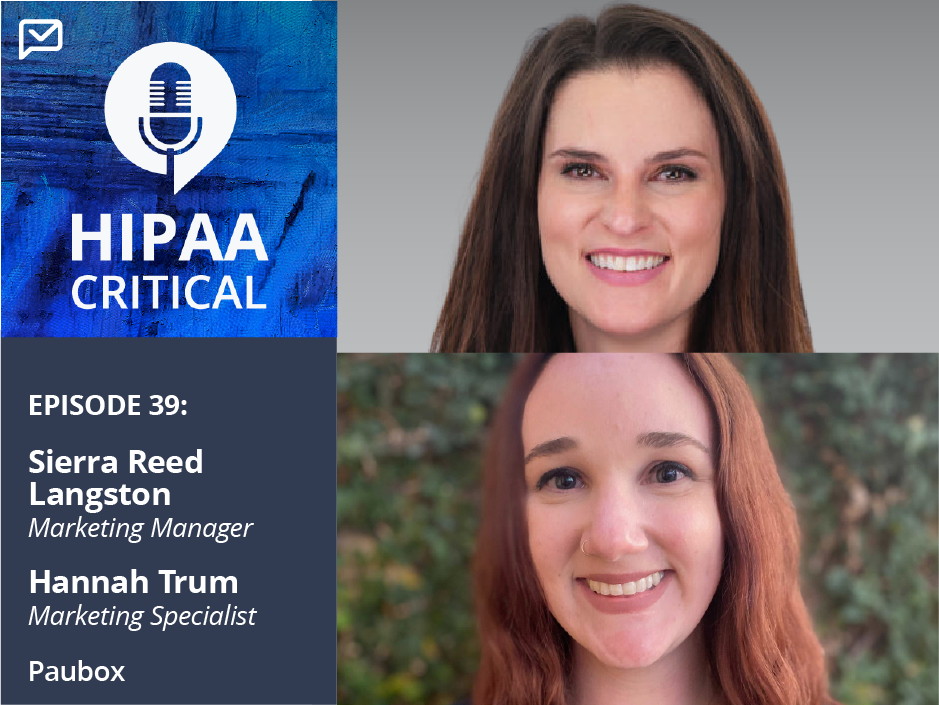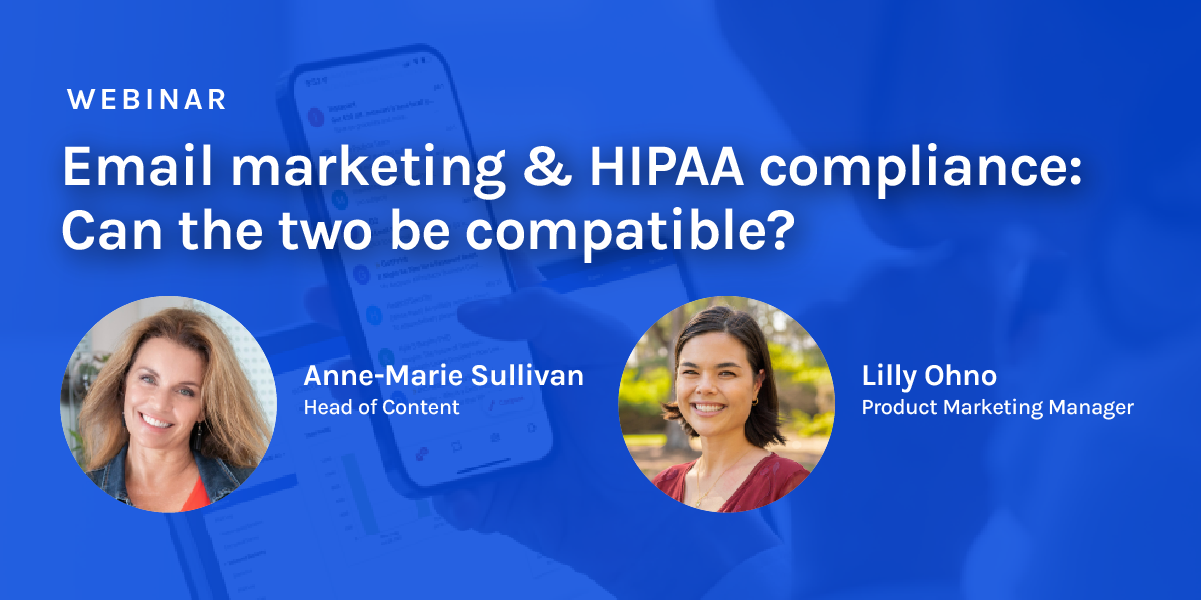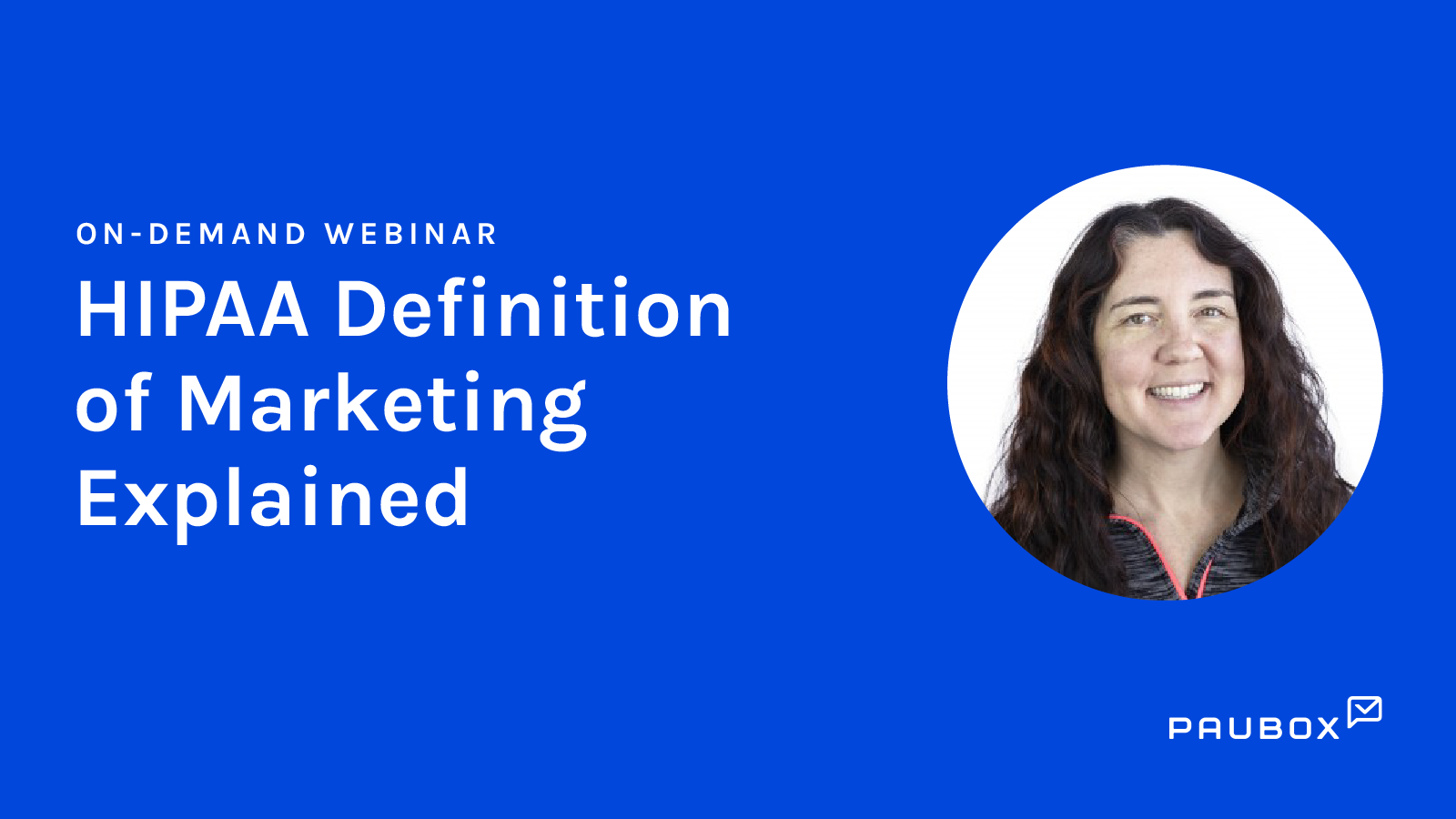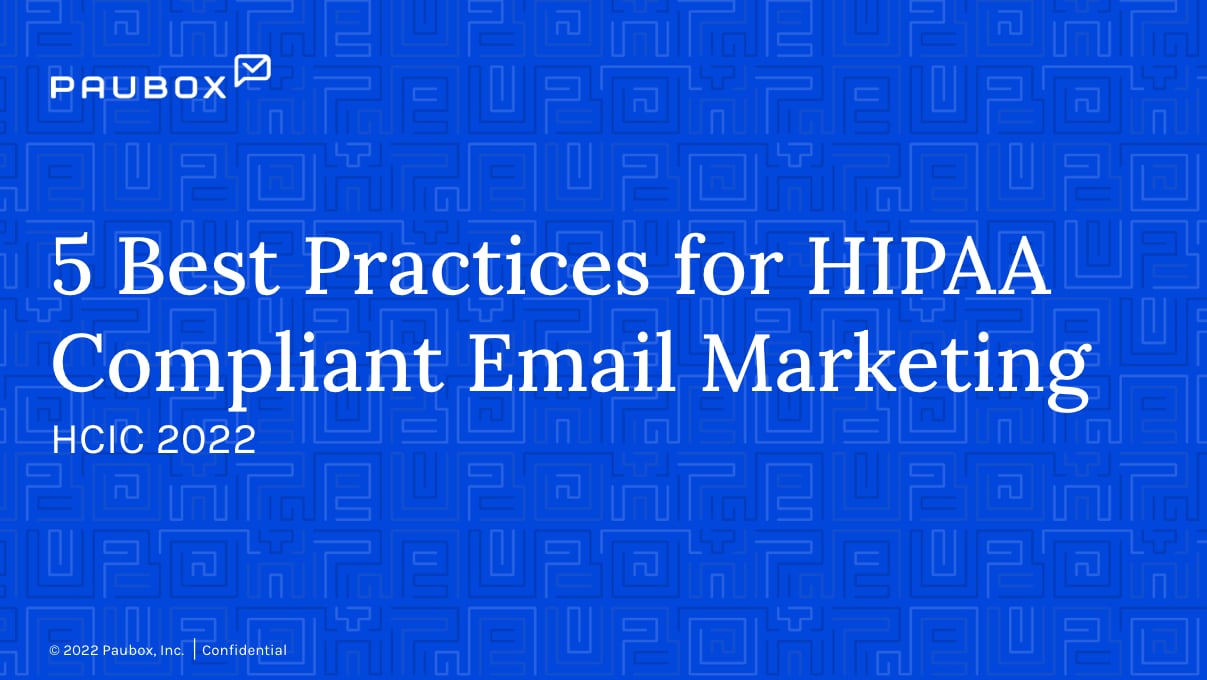6 min read
39. Hannah Trum: "Certifications are a no-brainer in the healthcare industry."
Hannah Trum Apr 14, 2021 12:00:00 AM

In this episode, you'll hear Sierra Langston, marketing manager, and Hannah Trum, marketing specialist, give their top takeaways from Paubox Spring Summit, Secure Communication During a Pandemic.
Rather read?
Hoala Greevy: It's precisely those insights that hatch today's inaugural Paubox Spring Summit. Our theme for today's Paubox Spring Summit is "Secure Communication During a Pandemic." Our speakers will be covering an array of topics around it.
Sierra: Last week, we conducted our inaugural Spring Summit titled "Secure Communication during a Pandemic." This one-day virtual conference featured C-Level healthcare industry executives and speakers from around the country. Anshul Pande from Stanford Children's Health, Tony UcedaVélez from VerSprite, and Patti Padmanabhan, CEO of Damo Consulting, to name a few. Hannah Trum, our Marketing Specialist here at Paubox, is going to give a recap of the event. Hi, Hannah, thank you for being with me today.Hannah Trum: Hi, Sierra. It's a pleasure as always.
Sierra: Hannah, would you mind giving our audience your top takeaways from Paubox Spring Summit?Hannah: Yes, of course.
On April sixth, we heard a lot of great information from our speakers. Here's what you missed at Paubox Spring Summit.
First, we have "Digital First Healthcare in a Post-Pandemic World" with Anshul Pande, Vice President and Chief Technology Officer at Stanford Children's Health. Anshul discussed what digital transformation in healthcare means in a post-pandemic world and how a focus on technology as a support instead of a crash.
Something I didn't know was that between 2019 and 2020, investment in healthcare technology doubled. As you know, the more we invest, the more new ideas, products, and services can be brought to the table.
My other top takeaway is the importance of empathetic design. If technology isn't easy for an end-user, whether that's a patient or a provider, they aren't likely to use it.
Anshul Pande: I want to talk about a couple of concepts. One of them is empathy. Everybody understands empathy. It's the ability to understand and share the feelings of another. What that drives towards is empathic design. That is a human-centered approach to the design of products.
The intent is to pay attention to the user's feelings towards the product. So the theory behind this is that the better you understand the users, the better you can create more meaningful products for them.
Hannah: The second session at Paubox Summit was with a few senior leaders from Vail Health.
Susan Ibáñez, Chris Lindley, and Julie Jackson spoke on how innovative technology allowed Vail Health to double its COVID-19 vaccine appointments in December 2020.
One thing that stood out to me the most was the commitment that Vail health has to its community.
Chris Lindley, Chief Population Health Officer, said during the panel that “at the end of the day, it all comes down to community impact. These technology changes have really helped our community.”
Chris Lindley: I think it's really the future, and that is allowing patients to direct not only their medical care but also when they schedule and how they do it on the convenience of their smartphone.
One thing we've learned through all of this is, you hear about it, but you don't see it tell it's really in an emergency. Everybody has a smartphone. Very few actually log on to a computer or want to take the time to make a phone call and set something up with the scheduler. Allowing them to do it very quickly from their phone and get the appointment scheduled at their liking is a great customer experience benefit.
As Julie and Susan mentioned, I believe this is something we want to do in the future.
Hannah: Our third session featured Tony UcedaVélez, a recent guest on our podcast. Sierra, you were actually the moderator for Tony's session. Why don't you share what you learned?
Sierra: Yeah, sure. So I could probably listen to Tony speak about cybersecurity for hours. He's extremely knowledgeable. I did already interview him on a podcast. So, key takeaways here. First, we have definitely talked about this on the podcast with Tony. Use multi-factor authentication on everything. Next, invest in email security and defend your endpoints. Another item that Tony touched on was old habits die hard. So you need to train your staff and train them often. Tony mentioned that training should be quick, efficient, relevant, and fun for staff.Tony UcedaVélez: The pandemic really forced a lot of companies to go through and further expand their cloud presence. This puts a lot of emphasis on the endpoint. For example, we see consumer electronics, laptops, mobile devices, printers, and IoT components that are all on the shared network you have in your home office environment.
So the criminals already map this out. They understand that they don't necessarily have to approach the device itself. They could go through phishing, malvertising, and drive-by download, but they can also do it by trying to undermine the corporate home environment. They will try to do this through popular routers like Alexa.
So the consideration really comes down to, from an IT management, governance, and security governance standpoint, understanding the new threat landscape of home devices that are neighboring now corporate devices that have potentially protected health information.
Hannah: I learned a lot from Tony's session, and it was nice to hear more follow-up information after the podcast episode we did recently.
Even though I work at Paubox, it's nice to tune into sessions or webinars where my co-workers are presenting new or updated information about our products. One of those was “How the Paubox Email API Can Help Fight the Pandemic.” This featured our very own Nick Wong and Dan Dorszynski.
My biggest takeaway from this session is that Paubox Email API can be the foundation or cornerstone of any modern health application, even outside of COVID-19.
By utilizing the Paubox Email API for the pandemic, providers can get positive or negative test results back to their patients faster and more securely.
Nick Wong: The common denominator here is whether we're automating or sending follow-up emails from contact tracers, reading and storing test result data from electronic health records, processing test results, or sending them to the local health department, Paubox Email API can help.
Hannah: During “A Uniform Approach to Sharing the Assurance and Other Certifications,” our audience heard from five industry leaders, including our esteemed moderator, Paddy Padmanabhan, CEO of Damo Consulting.
Other panelists featured include Michael Parisi, Vice President of Business Development and adoption at HITRUST; Brian Klein, principal at Webb Adams, a security privacy and compliance programs company; Michael Mead, CEO of the Medical Cost Saving Solution; and Howard Rosen, founder of LifeWire, a patented population management communication platform.
Sierra: This session was extremely stacked with speakers.Hannah: Definitely. Certifications are a no-brainer in the healthcare industry. This entire panel was fascinating. It was great to hear from everyone, including Paddy himself.
My top takeaway is an excellent quote from Paddy that, “certifications have become table stakes within the healthcare industry.” All four of our panelists agreed. They also said that the certification process is expensive. It's time-consuming, and there are a lot of moving parts. So you might need some help.
Sierra: Yeah. That's the type of folks that reach out to Brian Klein's company. A consulting aspect on the security privacy and compliance side.Paddy Padmanabhan: The next question is how difficult is it for a company to achieve their very first assurance or certification?
Brian Kline: The difficulty is really as strong as your program management skills. As we've talked about the entire day, choose the certification that lets you all be on the same page as we're trying to be certified. I care about security, but that is just throwing darts at dartboard certifications. I love them because of the black and white standard.
So project management is the tricky part, Paddy. This will let you know how difficult it is for a client to get certified.
Hannah: Our very last session for the day featured Matthew Wallace, Vice President of strategic initiatives and partnerships at EasterSeals Louisiana, and Aaron Collins, System Administrator at Developmental Center of the Ozarks.
Both of these organizations serve underserved communities within their state. During the session, the biggest thing that stood out to me was how Telehealth was the right solution for these types of organizations during the height of the pandemic.
Obviously, people couldn't go anywhere. Telehealth will continue to be an essential part of their services because the communities in rural areas greatly benefit from Telehealth.
Matthew Wallace: Once our folks went through it for a month or two, they found a great uptake amongst our more senior population. For a lot of those individuals, our team members are really the only person that they talk with. To have that interaction, typically, our business is set up with that population where we're doing a phone call.
Traditionally we have a phone call monthly, and then once a quarter, we would go out for a visit. We were thinking about a supplement where we'll still go out to the quarterly visit, but instead of making a phone call, we'll do a video call that allows the participant to show us around what's going on. So being able to put eyes on patients more frequently might be a positive side effect.
Sierra: Thanks, Hannah, for those learnings from our conference.Hannah: Definitely.
Sierra: Paubox Spring Summit 2021 was a one-day virtual event that provided the opportunity for attendees to listen to relevant content from thought leaders and remote networking with their peers. For more information about the Paubox summit, please visit Pauboxsummit.com or read the full recap on Paubox.com/blog . We are currently hosting monthly zoom social mixers for our customers and non-customers. Each mixer is about one hour, and every attendee will receive an adult beverage of their choice delivered to their door the day of attendance. These mixers are entirely free. Please send an email to sierra@paubox.com if you'd like to attend. As always, you can listen to every episode of the HIPAA Critical Podcast on Paubox.com or subscribe via Apple podcast, Spotify, IHeartRadio, Stitcher, or Amazon Music. Thanks and see you next time.Subscribe to Paubox Weekly
Every Friday we'll bring you the most important news from Paubox. Our aim is to make you smarter, faster.




